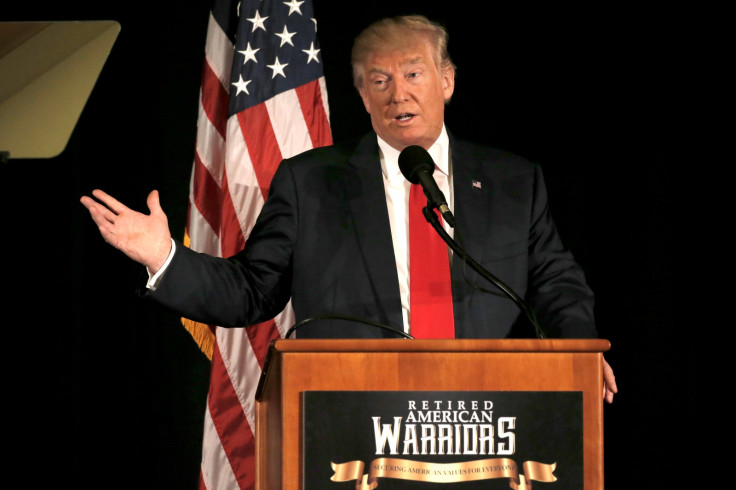Trump vows 'crippling counter-cyberattacks' against US enemies, calls it 'warfare of the future'
America's dominance in this arena must be unquestioned, the Republican presidential nominee said.

Republican presidential nominee Donald Trump on Monday (3 October) vowed to strengthen the US government's cybersecurity capabilities, saying it would be an 'immediate and top priority' in his administration if elected president.
Addressing a group of retired military veterans at an event in Virginia hosted by Retired American Warriors (RAWPAC), Trump said he would order a "thorough review of cyber-defences and weaknesses," adding that cyberattacks from foreign governments including "China, Russia and North Korea, along with non-state terrorist actors and organised criminal groups constitute one of our most critical national security concerns."
"To truly make America safe, we truly have to make cybersecurity a major priority," Trump said. "The scope of our cybersecurity problem is enormous. Our government, our businesses, our trade secrets and our citizens – most sensitive information – are all facing constant cyberattacks and reviews by the enemy."
Trump said that he would instruct the Department of Justice to create a joint task force, together with federal, state and local law enforcement authorities as well as international law enforcement "to crush this still-developing area of crime." He also added that he would ask his secretary of defence and the head of the Joint Chiefs of Staff to present recommendations "for strengthening and augmenting our cybercommand."
"As a deterrent against attacks on our critical resources, the United States must possess — and has to — the unquestioned capacity to launch crippling counter-cyberattacks. And I mean crippling, crippling," Trump said. "This is the warfare of the future. America's dominance in this arena must be unquestioned. And today, it's totally questioned."
"We should turn cyber warfare into one of our greatest weapons against the terrorists, and they have to know it's coming" he added. "Today is just the beginning of a long and overdue national discussion on how to protect ourselves from modern cyber crime and evolving national security threats and how to develop the cyber offense strategies necessary to gain a critical security edge in the 21st century.
Trump's latest comments follow a series of missteps and a drop in the polls, after a shaky performance against Democratic rival Hillary Clinton in the first presidential debate of the general election last week.
At the first candidate showdown at Hofstra University, Trump said it was still not clear if Russia was responsible for hacking the Democratic National Committee.
"I don't think anybody knows it was Russia that broke into the DNC," he said. "I mean, it could be Russia, but it could also be China. It could also be lots of other people. It also could be somebody sitting on their bed that weighs 400 pounds, okay?"
US and Democrat officials have said that threat actors linked to the Russian government were responsible for the hack into the DNC.
Clinton, who previously declared that her approach to digital security would build on President Barack Obama's Cybersecurity National Action Plan, said during the debate that the US needs to make it clear that it has "much greater capacity."
"We are not going to sit idly by and permit state actors to go after our information, our private-sector information or our public-sector information," she said. "And we're going to have to make it clear that we don't want to use the kinds of tools that we have. We don't want to engage in a different kind of warfare. But we will defend the citizens of this country."
However, experts have expressed concerns about an aggressive approach to cybersecurity, saying launching retaliatory cyberattacks could be risky in an arena were attribution to cyberattacks and hackers' identities are not always clear.
"To defend against somebody and to launch 'crippling counter-cyberattacks', we better be sure who this somebody is," Igor Baikalov, chief scientist for Securonix, told Infosecurity Magazine. "Attribution remains the most difficult aspect of the cyber warfare. The chances of hitting an innocent bystander who was set up for a fall by the more sophisticated adversary are too great to dismiss as a collateral damage."
© Copyright IBTimes 2025. All rights reserved.





















